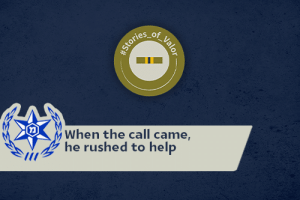Stories of Service: Karen Kendra Holmes

Karen Kendra Holmes
If President Trump only got to know who we are, got to sit down with transgender people who actually serve, then he would actually know that we’re really doing great things out there.
Karen Kendra Holmes has dedicated much of her adult life to serving her country and community, including more than five years in the Maryland Defense Force, a volunteer, state military agency that assists Maryland’s Army National Guard, Air National Guard, and Emergency Management Agency in fulfill She achieved the rank of Staff Sergeant before retiring in early 2017.
In December 2012, Holmes, a Silver Spring resident, was named NCO Soldier of the Year by the Maryland State Guard Association and the Defense Force. The following year, she received national recognition when the State Guard Association of the United States (SGAUS) honored her as Soldier of the Year. The awards honored Holmes for her leadership, competence, and achievements on the job.
As Brig. Gen. Brian R. Kelm, commanding general of the Defense Force, said after SGAUS honored her in 2013, “Sgt. Holmes perseveres through any and all obstacles in her efforts to complete a mission. She is very deserving of this honor and she continues to impress us all.”
Clearly, the fact that Holmes is transgender did not negatively affect her ability to serve in the military. In fact, when Holmes, who embraced her transgender identity in 2010 after many years of denial, enlisted in the Defense Force in 2011 the issue did not even come up. With a driver’s license, social security card, and passport reflecting her legal name change and female gender marker, along with the requisite medical sign-off from her personal physician, no one asked Holmes, and “there was never a reason to tell anybody,” she said. At the time, transgender people were not allowed to serve openly in the military.
Holmes acknowledged that hiding a part of herself was difficult. She wanted to be a visible role model for the transgender community.
“It’s tough living kind of a lie because of course all the female soldiers were coming up and telling me, ‘Thank you, you’re doing a great job representing us,’” she said. “And I thought, yeah, I am because I’m a woman, but I’m also doing it for the transgender community, which I couldn’t really talk about.”
Nonetheless, she loved military service. Holmes joined Defense Force primarily to exercise her search and rescue skills, which she honed volunteering for the American Red Cross for the National Capital Region’s Disaster Action Team and the Community Emergency Response Team in Prince George’s County–two of many organizations to which Holmes has donated her time and talent. But she relished carrying out other responsibilities like doing Honor Guard duty at military funerals, Color Guard duty in local parades, and helping soldiers in need as a chaplain’s assistant.
“I was really giving back to the community and that’s what I’ve always been focused on,” said Holmes.
Over time, a handful of Holmes’s fellow soldiers learned she was transgender. It never raised any issues, she said.
“They were totally okay with it because they said not only are you a great friend, but you’re a great soldier,” Holmes recalled.
Eventually, Holmes, who is employed as a federal safety officer, came out much more publicly in a 2015 interview with a Baltimore TV news reporter. At the time, the Pentagon had recently announced its plan to allow transgender people to serve openly in the military.
After five years of largely keeping the fact that she is transgender a secret in the Defense Force, coming out was a huge relief.
“I felt a lot better because I didn’t want to hide anymore,” Holmes said. “I was always worried within those five years that somebody was going to notice or somebody was going to say something and that I’d get kicked out of the Defense Force after putting my heart and soul into something I really wanted to do. It was really tough.”
Her fellow soldiers were very supportive, with several telling her she did a great job in the interview.
“Nothing changed between us,” said Holmes. “I still had the respect from the other soldiers as far as my rank. So this worked out really good.”
Holmes learned of the Trump administration’s announcement that the ban on transgender troops would be reinstated while doing volunteer work for Habitat for Humanity, the nonprofit that helps families in need build their own homes. She was on a build in Delaware when her phone started ringing nonstop, as concerned friends called to see whether she had heard the news.
“I was really bothered because if President Trump only got to know who we are, got to sit down with transgender people who actually serve, then he would actually know that we’re really doing great things out there,” said Holmes. “I take pride in earning my Soldier of the Year awards. I joined the Defense Force after I transitioned and still achieved all of these things. Obviously, I know what I’m doing and readiness isn’t an issue, which is what they claim.”
Despite the administration’s discriminatory stance toward transgender troops, Holmes remains committed to the military. She is currently a Sgt. First Class in the United States Veterans Reserve Corps, a nonprofit fraternal and service organization for veterans who wish to continue serving their communities in times of emergency or disaster.
Holmes said many Veterans Reserve Corps members know she is transgender. It doesn’t matter to them. What they care about, she said, is that she knows what she’s doing.
“They just want somebody who can serve and do this job right,” Holmes said. “I think that’s how a lot of soldiers feel about their fellow soldiers who might be transgender. They want somebody who they know has got their back. In the military, we have what we call ‘battle buddies’–somebody who’s looking out for me and I’m looking out for them.”




